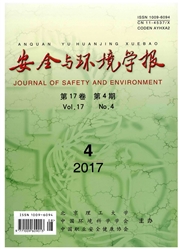

 中文摘要:
中文摘要:
采用蚕豆和洋葱根尖细胞微核检测技术,研究氰化钾(3mg/L、10mg/L、30mg/L、100mg/L和300mg/L)的遗传毒性效应。结果表明,3—300mg/L的氰化钾(KCN)处理12h可诱发蚕豆和洋葱根尖中微核细胞数目显著增高,最高增幅分别为330.49%和244.92%;可使分裂指数明显下降,最高降幅分别为31.01%和33.44%;根尖微核细胞数与处理浓度呈正相关,分裂指数与处理浓度呈负相关。研究表明,氰化钾具有遗传毒性作用,能引起DNA分子断裂。与蚕豆相比,洋葱对氰化钾具有更高的敏感性,因此可通过洋葱微核试验有效监测环境中的氰化钾污染。
 英文摘要:
英文摘要:
This study is concerned about an approach to evaluating the genotoxicity of potassium cyanide on the root tip cells of Viciafaba and AUium cepa by using the root tip micronucleus (MN) assay. As is known, potassium cyanide is a kind of most ubiquitous environmental contaminants which were usually resulted from the large-scale mining or other industrial and agricultural activities: Evidence of the presence of the general epidemiological reveals that long-term potassium cyanide exposure may lead to the incidence of various human diseases and even cancers. However, V. faba and A. cepa are excellent plants for the assay of chromosome aberration after a certain chemical treatment. It is for this purpose that we have done a series of experiments to test the genotoxicity of potassium cyanide on the root tip cells of V. faba and A. cepa. Our experimental results have shown that the mitotic index (MI) would be decreased whereas the M N frequency would increase significantly in V. faba and A. cepa root tips after seedlings were exposed to the potassium cyanide at the mass concentrations of 3 - 300 mg/L for 12 h. Both MN frequency and MI would change in a dose-dependent manner in V. faba and A. cepa root tips. The above results also show that A. cepa root tip cells were more sensitive to potassium cyanide toxicity than V. faba, suggesting that the cyanide tends to be a genotoxic agent and may induce the genetic damage in human cells. Thus, our research proves that A. cepa root tip micronucleus (MN) assays can be used as a cure for monitoring potassium cyanide-containing water contamination.
 同期刊论文项目
同期刊论文项目
 同项目期刊论文
同项目期刊论文
 期刊信息
期刊信息
